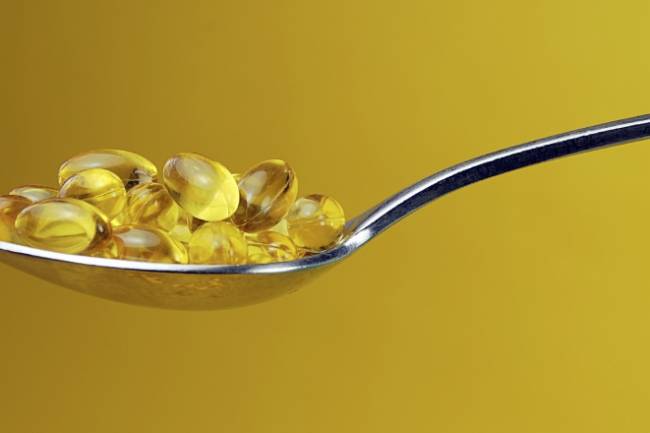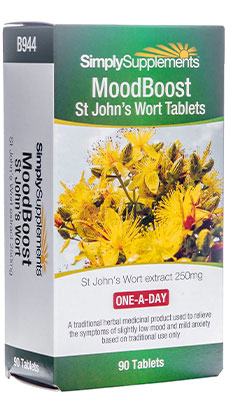Health Benefits of St John's Wort

St John's Wort has long been picked and used in medicine, even during ancient times. It’s a popular herbal remedy, often recommended to those feeling mentally fatigued or who have trouble unwinding. What exactly does this mean, and can the flower help with any other ailments around the body?
In this article we’ll explain some of the finer points of St John’s Wort, and how its supplements can benefit you from daily use. Much like many supplements, there can be some misinformation online about its abilities – we’re here to give you the facts.
What is St John's Wort?
St John’s Wort, also known as Hypericum perforatum, is a perennial plant native to Europe. It has golden yellow flowers and is often considered to be a weed as it grows in meadows and hedges. Despite this, the plant has been used medicinally for hundreds of years. Hippocrates and Pliny recorded several St Johns Wort benefits for wound healing and back pain, and during the middle ages in England it was often hung over doorways to ward off evil spirits.
The origin of its name is unclear. It is believed to be named after St John the Baptist and some experts have suggested that the small red specks on the flowers represent the blood of the martyred saint. Others simply believe that the name was given because the plant is in full bloom on St John’s Day (24th June).
The plant has been widely studied for its medicinal benefits and there is strong evidence to support its use in the treatment of mild to moderate depression. However, the mechanisms behind these benefits are not yet fully understood. The plant contains several chemicals called hypericin, hyperforin and flavonoids, which is why the herb is sometimes marketed as ‘Hypericum’.
St John's Wort and Depression
There is justifiable evidence to support the use of St John's Wort in the treatment of mild to moderate depression. However, more research is needed for the treatment of more severe bouts of depression.
A meta-analysis of 29 separate studies (involving a total of 5,489 participants) found St John's Wort to be as effective as antidepressant drugs at improving symptoms of depression, with 28% of participants more likely to see an improvement. The analysis also showed that St John's Wort caused few, if any, side effects, unlike the antidepressant medications taken by the control groups.
Although the mechanisms of action are not yet fully understood, it is thought that St John's Wort delays the reabsorption of the neurotransmitters serotonin, norepinephrine and dopamine, which means that more of these neurotransmitters are available to for the body to utilise.
Some reports have claimed that St John's Wort can be “as good at lifting depression as drugs like Prozac” and it has become the number one treatment for depression in several European countries, including Germany.
The flower has shown promise in reducing symptoms of SAD, including anxiety, low libido and sleep disturbances. It’s often used in combination with light therapy, another known treatment using UV lights to help lift the patient’s mood. In terms of scientific evidence, use of St John’s Wort specifically to help against SAD is light on the ground – better quality research needs to be conducted before a solid link can be made, despite its effectiveness against more traditional depression.
Other Benefits
In addition to depression, St John's Wort benefits health in several other ways:
- Menopause: There is some evidence to support the use of St John's Wort for the relief of hot flushes, particularly when taken in combination with black cohosh.
- Anxiety Disorders: It is thought that St John's Wort promotes feelings of stability and control, however, to date, there is insufficient evidence supporting its role as a mood stabiliser. This hypothesis may be related to the fact that many sufferers of depression also have symptoms of anxiety.
- Obsessive Compulsive Disorder (OCD): The evidence is inconclusive, but a couple of studies suggest that taking around 900mg of St John's Wort per day for 12 weeks may improve symptoms.
- Anti-inflammatory: St John's Wort may also offer anti-inflammatory benefits that help to relieve common aches and pains. One discussion piece describes these effects as “ignored potential” in the flower.
- Genital Herpes or Cold Sores: Some people find that St John's Wort helps to reduce early symptoms of cold sores including stinging and burning.
How Much Should I Take?
St John's Wort is available in several different forms, including tea, tinctures and supplements. The majority of trials have used 900 milligrams (mg) divided into three daily doses, but some have used as much as 1800mg per day. It may take several weeks, even months for the full benefits to be experienced.
In certain cases, St John's Wort may be suitable for children and adolescents, however, it should only be taken under the supervision of their GP. Trials involving children have used between 150mg to 1800mg of St Johns Wort extract daily. Do not give St John's Wort to children or adolescents without medical supervision.
There is currently insufficient safety data for use during pregnancy and lactation, and so should be avoided during this period.
Licensing and Registration
The preparation of the herb can vary greatly, so when purchasing a St John's Wort supplement look for a THR logo. The sale of this herb is licensed by the Medical and Healthcare Products Regulatory Agency (MHRA), which means that in order to be placed on the UK market the supplement needs to carry its registration mark. This mark shows that the supplement is licensed, approved and manufactured to a safe and acceptable standard.
St John's Wort Side Effects
St John's Wort has an excellent safety record when used in the correct way. For some people, the herb may cause mild side effects, including dry mouth, dizziness, constipation, gastrointestinal symptoms and sensitivity to sunlight.
It may interact with certain medications, including warfarin, protease inhibitors, anti-epilepsy medications, and oral contraceptives. It should not be taken alongside other anti-depressants, and is known to interact with chemotherapy drugs, so should not be taken in the weeks prior to or during chemotherapy. If you are taking any prescription medications you should consult with your GP prior to taking St John's Wort.
Conclusion
The common idea of St John’s Wort helping with mild depression is the claim that holds the most water, with plenty of research pointing to that conclusion. Although its effects on other mental illness are not as thoroughly studied, there’s also some hope for those with the likes of anxiety issues and OCD. In other areas of the body, the evidence becomes much weaker, but the research is still ongoing. In the next few years, we may see just what St John’s Wort is capable of in helping physical ailments.
Please also remember that if you’re taking medication for depression or other mental health issues, St John’s Wort is not a replacement for prescription medication. If you experience heavy bouts of depression or find that St John’s Wort doesn’t ease your symptoms, visit your GP as soon as possible to devise a professional support plan.

 Nicole
Nicole 

























